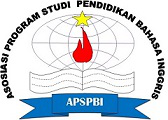Using The Quizizz as an Assessment of Students' English Learning
Abstract
Education is becoming more advanced with increasingly sophisticated technology. The use of education-based ICT has evolved since the mid-twentieth century promoting e-learning as an alternative to facilitating student learning. The purpose of this study is to explore students' views on using the Quizizz application as an assessment tool for students' English learning. The design of this research is a qualitative approach. The sample of this research is 3 students of SMKN 1 Pakisjaya. Data was collected through observation, interviews and documentation. The results of the study showed students' perspectives on the use of Quizizz. In conclusion, the students strongly agree that the Quizizz application is a medium for learning and assessing English because this application has an attractive appearance.
Keywords: Assessment, Quizizz, English Learning
Full Text:
PDFReferences
Amalia, D. F. (2020). Quizizz Website as an Online Assessment for English Teaching and Learning: Students’ Perspectives. Jo-ELT (Journal of English Language Teaching) Fakultas Pendidikan Bahasa & Seni Prodi Pendidikan Bahasa Inggris IKIP, 7(1), 1. https://doi.org/10.33394/jo-elt.v7i1.2638
BAL, S. (2018). International Journal of Language Academy USING QUIZIZZ . COM TO ENHANCE PRE- INTERMEDIATE STUDENTS ’ VOCABULARY KNOWLEDGE Orta Düzey Öğrencilerin Kelime Bilgisi ni Arttırmak İçin. International Journal of Language Academy, 6(September), 295–303.
Basuki, Y., & Hidayati, Y. (2019, April). Kahoot! or Quizizz: the Students’ Perspectives. In Proceedings of the 3rd English Language and Literature International Conference (ELLiC)(2019)(Online:https://www.researchgate.net/publication/334358438_Kahoot_or_Quizizz _the_Students' _Perspectives).
Brookhart, S. M. (2012). Teacher feedback in formative classroom assessment. In Leading Student Assessment. https://doi.org/10.1007/978-94-007-1727-5_11
Bury, B. (2017). Testing Goes Mobile – Web 2.0 Formative Assessment Tools. International Conference ICT for Language Learning. Retrieved February 12, 2019, from https://conference.pixel-online.net/ICT4LL/files/ict4ll/ed0010/FP/4060-ETL2655-FPICT4LL10.pdf.
Darmawan, M. S., Daeni, F., & Listiaji, P. (2020). the Use of Quizizz As an Online Assessment Application for. 9(3), 144–150.
Degirmenci, R. (2021). The Use of Quizizz in Language Learning and Teaching from the Teachers ’ and Students ’ Perspectives : A Literature Review. Language Education and Technology (LET Journal), 1(1), 1–11.
Handoko, W., Mizkat, E., Nasution, A., & Eska, J. (2021, February). Gamification in Learning using Quizizz Application as Assessment Tools. In Journal of Physics: Conference Series (Vol. 1783, No. 1, p. 012111). IOP Publishing
Junior, J. B. B. (2020). Assessment for Learning With Mobile Apps: Exploring the Potential of Quizizz in the Educational Context. International Journal of Development Research, 10(1), 33366–33371.
Ju, S. Y., & Adam, Z. (2018). Implementing Quizizz as game based learning in the Arabic classroom. European Journal of Social Science Education and Research, 5(1), 194-198.
Lim, T. M. (2021). Teachers ’ Perception towards the Use of Quizizz in the Teaching and Learning of English : A Systematic Review.
Loyd, G. E., & Koenig, H. M. (2008). Assessment for Learning: Formative Evaluations. International Anesthesiology Clinics, 46(4), 85–96. https://doi.org/10.109 7/AIA.0b013e31818623df
McMillan, J. H., & Hearn, J. (2008). Student self-assessment: The key to stronger student motivation and higher achievement. Educational Horizons, 87(1), 40-49.
Priyanti, N. W. I., Santosa, M. H., & Dewi, K. S. (2019). Effect of Quizizz Towards the Eleventh-Grade English Students’ Reading Comprehension in Mobile Learning Context. Language and Education Journal Undiksha, 2(2), 71–80. https://doi.org/10.23887/leju.v2i2.20323
Qu, W., & Zhang, C. (2013). The Analysis of Summative Assessment and Formative Assessment and Their Roles in College English Assessment System. Journal of Language Teaching and Research, 4(2), 335–339. https://doi.org/10.4 304/jltr.4.2.335-339
Rahayu, I. S. D., & Purnawan, P. (2018). The Use of Quizizz in Improving Students’ Grammar Understanding Through Self Assessment. Advance in Social Science Education and Humanities Research. Vol 254. Retrieved March 5, 2019, from https://www.researchgate.net/publication/334422905_The_Use_of_Quizizz_in_Improv ing_Students'_Grammar_Understanding_through_Self-Assessment.
Vagholkar, K. (2019). OSCE as a Summative Assessment Tool for Undergraduate Students of Surgery—Our Experience. Indian Journal of Surgery, 81(4), 412. https://doi.org/10.1007/s12262-018-1827-z
Zhao, F. (2019). Using Quizizz to Integrate Fun Multiplayer Activity in the Accounting Classroom. International Journal of Higher Education, 8(1), 37-43.
Zuhriyah, S., & Pratolo, B. W. (2020). Exploring students’ views in the use of quizizz as an assessment tool in english as a foreign language (efl) class. Universal Journal of Educational Research, 8(11), 5312–5317. https://doi.org/10.13189/ujer.2020.081132
DOI: http://dx.doi.org/10.20527/jetall.v5i1.10859
Article Metrics
Abstract view : 1343 timesPDF - 2570 times
Refbacks
- There are currently no refbacks.
This journal is indexed in:


This Journal is listed in:
 Journal of English Teaching, Applied Linguistics and Literatures (JETALL)
Journal of English Teaching, Applied Linguistics and Literatures (JETALL)








.png)



1.png)
